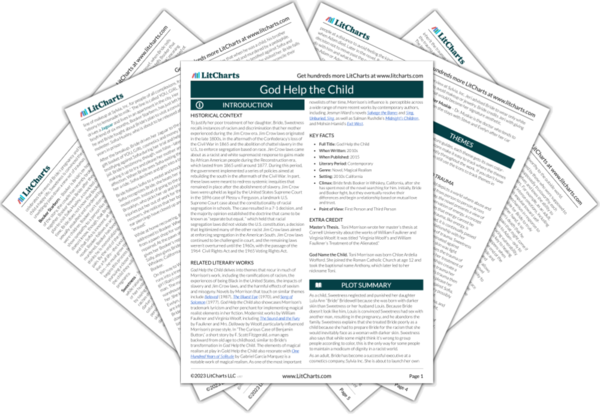Sweetness uses colorism to defend her poor treatment of her daughter, Bride, who was born with inexplicably dark skin. She explains that she is “high yellow” and that many of her relatives passed for white. Sweetness thinks of Bride’s skin color as “terrible,” and it drives her “mad” to the point that she considers killing Bride when she is a baby. With that in mind, the novel shows how Sweetness has internalized racism that she herself has faced and then weaponizes those ideas against her daughter. Though Sweetness claims to treat Bride poorly to protect her against the racism that Bride will, in her view, inevitably experience in the world, Sweetness is aware that her colorism might be harmful and discriminates against her daughter anyway. Sweetness explains that while some might consider it wrong to group people according to color, with “the lighter the better,” she considers it important to “hold on to a little dignity,” to avoid being spit on at the grocery store or ignored and shoved into the gutter so that white people could have the sidewalk. Thus, while Sweetness may have some good intentions in raising her child to be tough, she also defends colorism because she benefits from it. In so doing, she actively legitimizes and perpetuates the racism she herself has suffered, internalizing a white-supremacist philosophy of “the lighter the better” and, perhaps, instilling the same mentality in her daughter. God Help the Child thus examines broader ramifications of systemic racism, showing how victims of racism (and discrimination in general) can internalize that racism, leading them to purposefully or unwittingly impose the mistreatment they have experienced onto others, thereby perpetuating and legitimizing that mistreatment.
Racism and Colorism ThemeTracker

Racism and Colorism Quotes in God Help the Child
Part 1, Chapter 1: Sweetness Quotes
It’s not my fault. So you can’t blame me. I didn’t do it and have no idea how it happened.
Part 1, Chapter 4: Bride Quotes
Nothing announced her attack on me. I’ll never forget it, and even if I tried to, the scars, let alone the shame, wouldn’t let me.
Memory is the worst thing about healing.
As we walked down the courthouse steps she held my hand, my hand. She never did that before and it surprised me as much as it pleased me because I always knew she didn’t like touching me. I could tell. Distaste was all over her face when I was little and she had to bathe me. Rinse me, actually, after a halfhearted rub with a soapy washcloth. I used to pray she would slap my face or spank me just to feel her touch.
Part 1, Chapter 5: Sweetness Quotes
Oh, yeah, I feel bad sometimes about how I treated Lula Ann when she was little. But you have to understand: I had to protect her. She didn’t know the world. There was no point in being tough or sassy even when you were right. Not in a world where you could be sent to a juvenile lockup for talking back or fighting in school, a world where you’d be the last one hired and the first one fired. She could know any of that or how her black skin would scare people or make them laugh or trick her.
Part 1, Chapter 6: Bride Quotes
“Come on, baby, you’re not responsible for other folks’ evil.”
Part 3 Quotes
He suspected most of the real answers concerning slavery, lynching, forced labor, sharecropping, racism, Reconstruction, Jim Crow, prison labor, migration, civil rights and black revolution movements were all about money. Money withheld, money stolen, money as power, as war. Where was the lecture on how slavery alone catapulted the whole country from agriculture into the industrial age in two decades? White folks’ hatred, their violence, was the gasoline that kept the profit motors running.
When the police responded to their plea for help in searching for Adam, they immediately searched the Starberns’ house—as though the anxious parents might be at fault. They checked to see if the father had a police record. He didn’t. “We’ll get back to you,” they said. Then they dropped it. Another little black boy gone. So?
Part 4, Chapter 2 Quotes
Complaining about her mother, she told him that Sweetness hated her for her black skin.
“It’s just a color,” Booker had said. “A genetic trait—not a flaw, not a curse, not a blessing nor a sin.”
“But,” she countered,” other people think racial—”
Booker cut her off. “Scientifically there’s no such thing as race, Bride, so racism without race is a choice. Taught, of course, by those who need it, but still a choice. Folks who practice it would be nothing without it.”
His words were rational and, at the time, soothing but had little to do with day-to-day experience—like sitting in a car under the stunned gaze of little white children who couldn’t be more fascinated if they were at a museum of dinosaurs.
“I’m not sure I should, now.” Bride shook her head. She had counted on her looks for so long—how well her beauty worked. She had not known its shallowness or her own cowardice—the vital lesson Sweetness taught and nailed to her spine to curve it.
Having confessed, Lula Ann’s sins she felt newly born. No longer forced to relive, no, outlive the disdain of her mother and the abandonment of her father.











